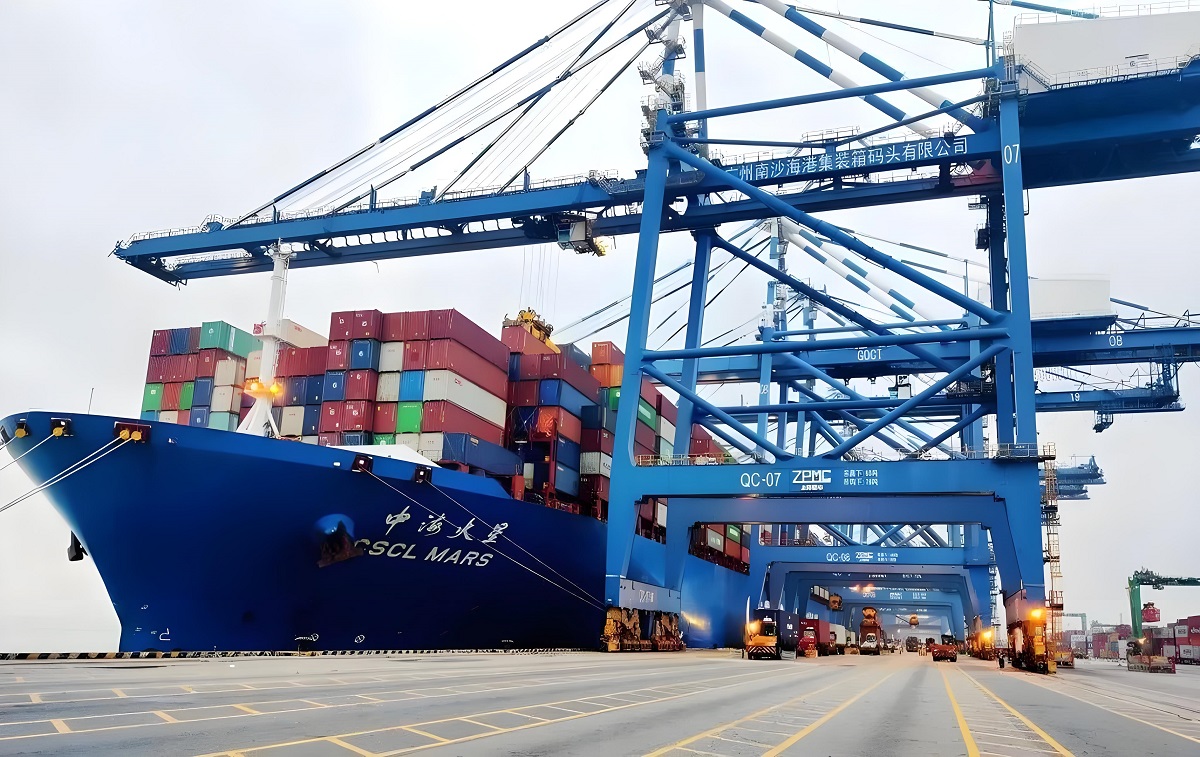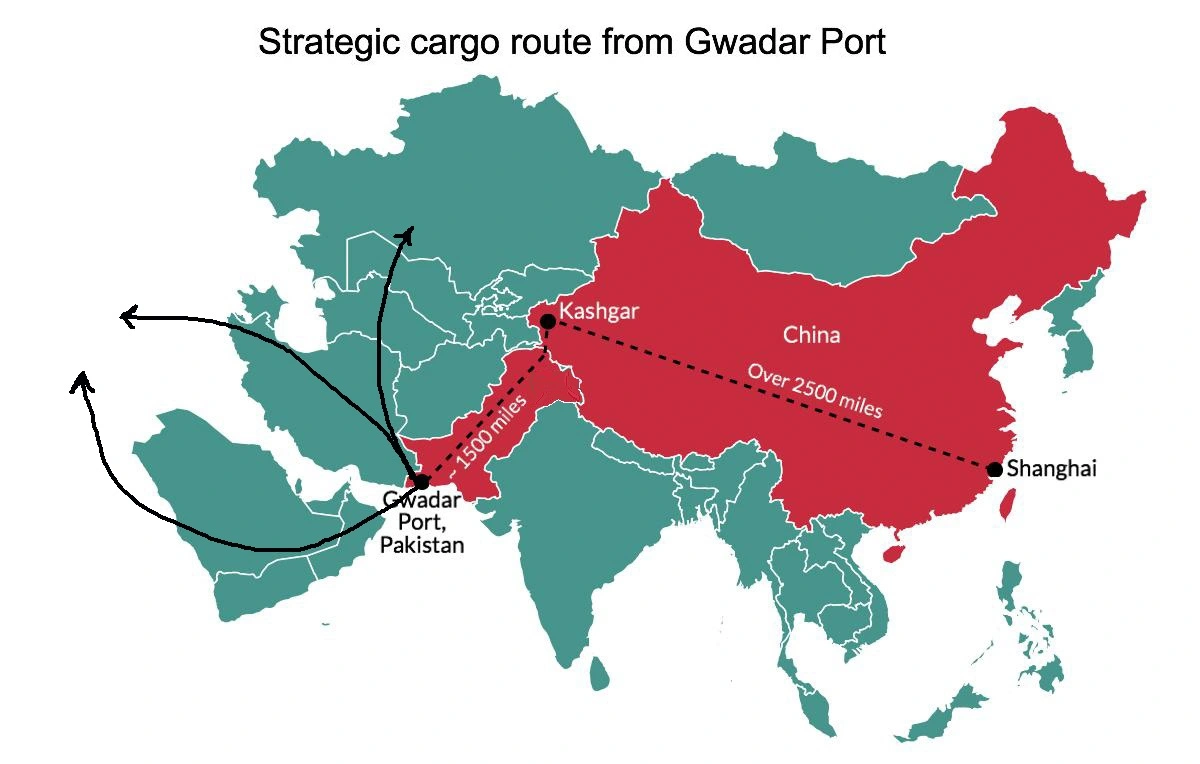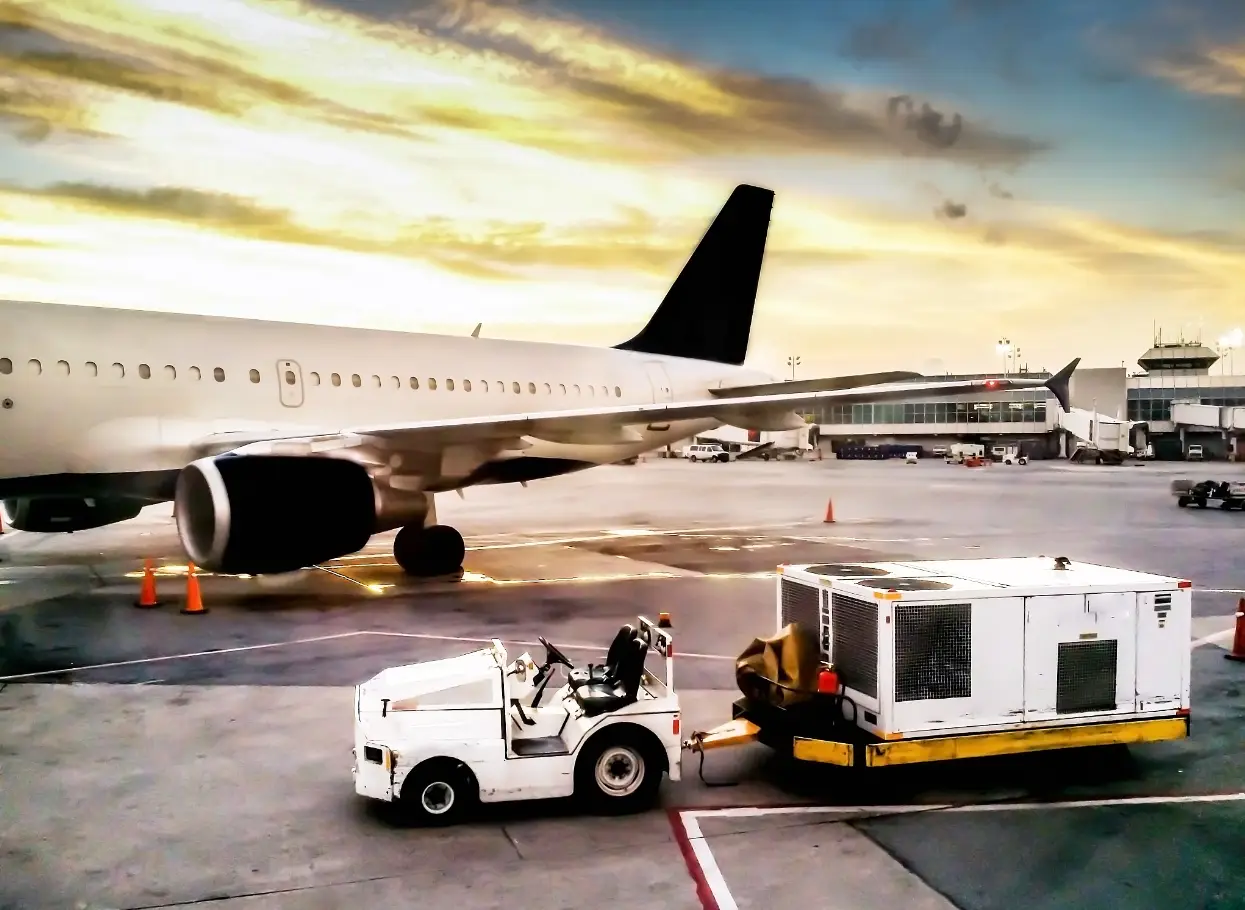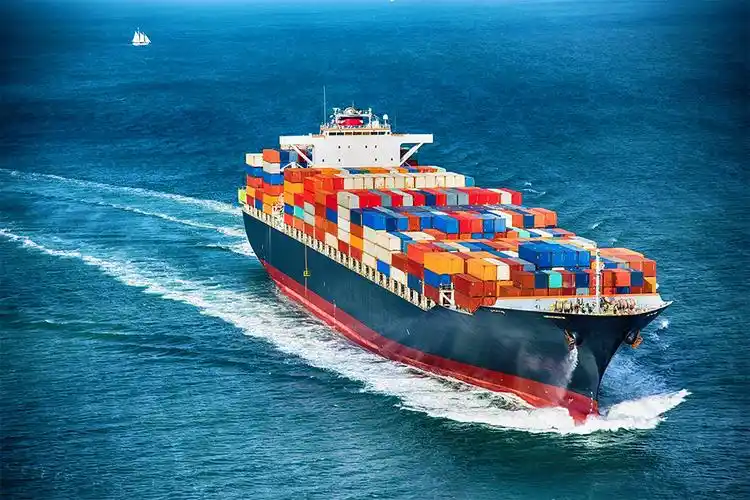Cost and Time Considerations for Shipping from China to Pakistan
In 2023, the total bilateral trade volume between China and Pakistan reached 181.53 billion US dollars, indicating a continuous strengthening of economic cooperation between the two countries and an increasingly close bilateral trade relationship. China has been Pakistan's largest trading partner, largest source of imports, and second largest source of imports for nine consecutive years.
Pakistan is located in South Asia, with a coastline of over 1000 kilometers and borders the Arabian Sea and the Gulf of Oman to the south. The country borders China to the northeast, India to the east, Afghanistan to the west, and Iran to the southwest. Therefore, the transportation of goods between China and Pakistan can be carried out by sea, air, railway, and road.
What Is The Best Way To Ship Goods From China To Pakistan
Shipping from China to Pakistan can be done by sea, air, rail and road, each method has advantages, you can read below to choose the best method for you.
Sea Freight From China To Pakistan
Trade between China and Pakistan depends largely on sea routes, linking the two countries’ core industrial centers and creating a significant economic alliance. Important cargo ports such as Shanghai, Shenzhen in China and Karachi in Pakistan ensure the stable flow of goods.
One of the main advantages of sea shipping is its low cost. This is an easy and economical option for entrepreneurs who want to save money. Ocean shipping has fewer weight and size restrictions and is suitable for transporting large quantities of goods.
You can pay for the entire box or just for the space it takes up. The first option is convenient for transporting bulk goods, while the second option is more suitable for small businesses.
Pakistan has two main ports, Karachi and Port Qasim. Most seaborne goods are transported directly after domestic shipment and undergo customs clearance before delivery. This method is suitable for bulky and heavy goods.
Sea freight from China to Pakistan via LCL or FCL?
LCL
LCL (Less Than Container Load), the package is packed in a container (grouped with other customers). At the destination, the container is unbundled by the service provider. All these operations are not without risks for the cargo. Packaging and strict palletization are critical. There are two types of grouping. The shipping company will do the LCL, and the supplier will do the LCL by the freight forwarder.
FCL – Full Container
FCL or Full Container Load is the most common solution. Goods are shipped individually in closed steel boxes. Goods can be loaded in batches to optimize the entire space of the container.
There are generally three types of FCL:
- 20-foot container, internal capacity 33 cubic meters;
- 40-foot container can carry up to 66 cubic meters;
- 40-foot high container with an internal capacity of 76 cubic meters.
Pakistan’s main shipping port
Karachi port
Location and throughput: The port, located in Karachi, Pakistan’s largest city, is the country’s busiest port and one of the largest in South Asia, with a cargo volume of approximately 1.8 million TEU in 2019.
Major Trading Partners and Strategic Importance: Karachi Port handles most of Pakistan’s trade with its major trading partners such as China, UAE, Saudi Arabia and USA. It is strategically located near the Arabian Sea and is a major trade gateway into and out of Pakistan.
Business background: If you want to penetrate Pakistan’s domestic market or expand trade in South Asia, the Port of Karachi has significant strategic advantages due to its high throughput capacity and well-established trade routes.
Gwadar port
Location and cargo volume: Gwadar Port is located in the southwestern province of Pakistan and has become a new trade hub. After the development plan is completed, the cargo volume is expected to be approximately 500,000 TEUs.
Major Trading Partners and Strategic Importance: Underpinned by China’s Belt and Road Initiative, Gwadar Port is expected to strengthen trade ties between China and the Middle East, besides benefiting trade with Pakistan. Its strategic importance lies in its proximity to the Strait of Hormuz, through which much of the world’s oil passes.
Business Background: If your business involves trade between China and the Middle East, Gwadar Port is a noteworthy consideration. Its planned expansion and infrastructure development are expected to significantly increase cargo handling efficiency and volumes in the coming years.
Qasim port
Location and volume: Port Qasim, located 35 kilometers east of Karachi, is Pakistan’s second major maritime gateway. In 2019, the company handled approximately 41 million tons of cargo, demonstrating the company’s important role in the country’s freight industry.
Main trading partners and strategic importance: Port Qasim is Pakistan’s trade center, and its main trading partners include China, Singapore, Japan, France, Italy and Germany. It is also critical for the import of LNG, coal and their contribution to the country’s energy industry.
Business Background: If your business is primarily focused on energy commodities, including LNG and coal, Port Qasim, with its specialized LNG and coal handling facilities, could become a key component of your logistics strategy.
Air Freight From China To Pakistan
Air freight is the fastest and most reliable mode of transportation. It is ideal for time-sensitive freight and high-value cargo. However, air freight can be expensive, especially for larger or heavier shipments. Despite its higher cost, the speed and security offered by air freight make it a popular choice for many businesses and individuals.
Air freight will be the most efficient solution if the following conditions are met:
Your cargo is less than 2 cubic meters and less than 200 kilograms
You are in a hurry to receive/send goods
Pakistan major international airports
Benazir Bhutto International Airport
Freight Volume: Handles over 100,000 tons of cargo annually.
Major trading partners: Major trading partners include China, the United Arab Emirates, Saudi Arabia, the United Kingdom and the United States.
Strategic importance: Located in the capital, Islamabad, it is a major hub for passenger and freight transport, connecting major global routes.
Distinguished features: Equipped with modern freight facilities, complete warehousing and cold storage, and efficient loading and unloading operations.
Right for your business: If your transportation strategy involves frequent heavy cargo handling and direct routes to major global markets, this airport may be the best choice.
Allama Iqbal International Airport
Cargo Volume: Handles over 150,000 tons of cargo annually.
Main trading partners: The main cargo transportation comes from China, India, the United Arab Emirates, Saudi Arabia and Germany, France, Spain, Portugal, and the Netherlands.
Strategic Importance: As Lahore’s main airport, it is an important connection point with the most populous province of Punjab, known for its industrial sector.
Distinguished Features: Offers three terminals with high-capacity cargo handling and state-of-the-art cargo storage facilities.
For your business: If your goods are manufactured in Punjab or nearby areas, using this airport for global shipping can reduce your domestic shipping costs.
Jinnah international airport
Cargo volume: With over 350,000 tons of cargo per year, it is Pakistan’s busiest cargo airport.
Main trading partners: China, the United Arab Emirates, Saudi Arabia, Russia, Turkey and Europe are the main trading partners.
Strategic Importance: As the main gateway to Karachi, Pakistan’s largest city and financial center, it plays a key role in the country’s import and export activities.
Distinctive features: It has the largest freight terminal in Pakistan with advanced facilities.
Right for your business: Enhanced cargo throughput and efficient cargo handling make this airport ideal for high-volume and time-sensitive freight.
Faisalabad International Airport
Cargo volume: manages approximately 20,000 tons of cargo annually.
Main trading partners: Mainly serving Egypt, the Middle East, China and Europe.
Strategic Importance: Located in Faisalabad, a major industrial city known for its important role in the textile industry.
Salient Features: Specialized facilities for textile related goods.
Right for your business: If your business is related to the textile industry, this airport and its industry-specific facilities may be an ideal shipping point.
Quetta International Airport
Cargo volume: Handles approximately 10,000 tons of cargo annually.
Major trading partners: Mainly meeting the import and export needs of the Middle East and China.
Strategic importance: Serving Balochistan, Pakistan’s largest but sparsely populated province rich in mineral resources.
Distinctive features: modern facilities with large refrigeration units, especially suitable for the export of fruits and vegetables.
For your business: If your transportation involves fresh produce or minerals from Balochistan, Quetta International Airport may be a strategic location for your logistics.
Rail Freight From China To Pakistan
Pakistan has 11,881 kilometers (7,383 miles) of railways. The China-Pakistan Economic Corridor aims to develop the railway network and improve train efficiency and speed. The second phase of the project is underway and expected to be completed in 2021. In other words, Pakistan’s railway network will be extended to high-performance China, which will greatly ease trade between the two countries.
This mode of transportation should be a very interesting solution for importers/exporters who want to benefit from these infrastructures. Additionally, since rail freight is much faster than sea freight, this mode of transportation can be a good alternative between sea and air freight. In fact, rail transport is cheaper than air transport.
Land Transportation From China To Pakistan
The Karakoram Highway is a major land transportation hub connecting China and Pakistan. Starting from the border port of Khunjerab, it is 130 kilometers away from Taxkorgan County, 420 kilometers away from Kashgar, and 1,890 kilometers away from Urumqi. In Pakistan, after leaving Khunjerab, it is 125 kilometers away from Sost, 270 kilometers away from Gilgit, the capital of the northern region, and about 870 kilometers away from the capital Islamabad.
How Much Does It Cost To Ship To Pakistan From China In 2024
Shipping market prices are changing rapidly. Ocean, air and rail freight prices fluctuate over time, affected by supply and demand and carrier strategic adjustments. Year-over-year differences can be significant, and last week’s prices may not apply to this week.
The price from China to Pakistan can only be estimated, if you want to know the latest and most correct price, you can contact Presou Logistics to get a quote.
Cost Of Shipping 20ft & 40ft Container From China To Pakistan
How much does it cost to ship a 20-foot container from China to Pakistan? The average price to ship a 20-foot container from China to Pakistan is US$1,050 to US$2,050. Shipping schedules for shipping 20-foot containers from China to Pakistan vary by route.
How much does it cost to ship a 40-foot container from China to Pakistan? The average price to ship a 40-foot container from China to Pakistan is $1,550 to $3,050. Shipping schedules for shipping 40-foot containers from China to Pakistan vary by route.
| Container shipping service from China to Pakistan | Type of container | Ocean freight rates from China to Pakistan |
|---|---|---|
| How much does it cost to ship a container from Shanghai China to Pakistan | 20 foot container FCL 40 foot container FCL |
average price from: $1550 20FT average price from: $2550 40FT |
| How much does it cost to ship a container from Shenzhen China to Pakistan | 20 foot container FCL 40 foot container FCL |
average price from: $1250 20FT average price from: $2850 40FT |
| How much does it cost to ship a container from Ningbo-Zhoushan China to Pakistan | 20 foot container FCL 40 foot container FCL |
average price from: $1300 20FT average price from: $2250 40FT |
| How much does it cost to ship a container from Hong Kong China to Pakistan | 20 foot container FCL 40 foot container FCL |
average price from: $1150 20FT average price from: $1550 40FT |
| How much does it cost to ship a container from Guangzhou China to Pakistan | 20 foot container FCL 40 foot container FCL |
average price from: $1050 20FT average price from: $2050 40FT |
| How much does it cost to ship a container from Qingdao China to Pakistan | 20 foot container FCL 40 foot container FCL |
average price from: $1550 20FT average price from: $2050 40FT |
| How much does it cost to ship a container from Tianjin China to Pakistan | 20 foot container FCL 40 foot container FCL |
average price from: $1250 20FT average price from: $2250 40FT |
| How much does it cost to ship a container from Dalian China to Pakistan | 20 foot container FCL 40 foot container FCL |
average price from: $1350 20FT average price from: $2350 40FT |
| How much does it cost to ship a container from Xiamen China to Pakistan | 20 foot container FCL 40 foot container FCL |
average price from: $1050 20FT average price from: $1750 40FT |
| How much does it cost to ship a container from Yingkou China to Pakistan | 20 foot container FCL 40 foot container FCL |
average price from: $1250 20FT average price from: $1850 40FT |
Air Freight Cost Per Kilogram From China To Pakistan
Air freight from China to Pakistan costs approximately US$3 to US$8 per kilogram, the precise costs may fluctuate as they are affected by a number of factors such as the distance from the departure and arrival airports, the size and weight of the cargo, and the nature of the cargo . If you want to know the most accurate cost at that time, you can consult Presou Logistics.
How Long Does It Take To Ship From China To Pakistan
Sea freight from China to Pakistan takes 15 to 25 days, air freight takes 1 to 5 days, rail transportation takes 12 to 14 days, and road transportation takes 10 to 12 days.
Sea Freight Time From China To Pakistan
| Karachi | Qasim | Gwadar | |
|---|---|---|---|
| Tianjin | 20-25 days | 22-25 days | 25-27 days |
| Dalian | 20-23 days | 22-25 days | 23-25 days |
| Shanghai / Ningbo | 20-22 days | 21-25 days | 20-24 days |
| Guangzhou/Hong Kong | 18-22 days | 18-23 days | 19-22 days |
| Qingdao | 22-25 days | 22-24 days | 20-25 days |
Air Freight Time From China To Pakistan
| Jinnah International Airport | Benazir Bhutto International Airport | Allama Iqbal International Airport | |
|---|---|---|---|
| Beijing | 2-3 days | 2-4 days | 2-5 days |
| Shanghai | 2-3 days | 1-3 days | 1-3 days |
| Guangzhou | 2-5 days | 1-3 days | 2-4 days |
How To Import From China To Pakistan?
Importing goods into Pakistan requires following a series of procedures and regulations. Here are the general steps for importing from China to Pakistan:
- Register a Company: You must register a company or become a legal business entity in Pakistan. This will enable you to engage in import and export activities in Pakistan.
- Obtain an import license: Depending on the type of goods, you may need a specific import license. You can check with the relevant Pakistani government departments to confirm whether special permission is required.
- Determine the HS Code: Know the exact customs code, known as the HS code, of the goods you want to import. This is an international standard code used to classify and identify goods.
- Find Suppliers: Contact suppliers in China and make an agreement to purchase the goods you want to import.
- Sign contracts: Sign purchase and sales contracts with suppliers, making sure they contain detailed information about goods, prices, quantities, payment terms, quality requirements and delivery methods.
- Arrange Shipping: Decide how your shipment will be delivered to Pakistan (sea, air or land) and work with a logistics company to arrange shipping.
- Pay Duties and Taxes: Make sure you understand the duties and other taxes applicable to goods imported into Pakistan and make the necessary payments during the import process.
- Customs Declaration: Upon arrival at Pakistan Customs, you must submit the necessary documents and customs declaration to complete the import process.
- Pay Customs Fees: You must pay various customs fees, including duties, VAT, and other applicable fees.
- Receive the shipment: After completing customs formalities, you can receive the shipment and transport it from the port or airport to your destination.
Products Imported From China To Pakistan
Major products imported from China to Pakistan include electronics, machinery and transport equipment, excavators, chemicals (plastics, pharmaceuticals, etc.), food, fitness equipment, clothing, toys and furniture.
Pakistan Customs Clearance
When bringing goods into Pakistan from other countries, you must clear customs to avoid legal and financial issues.
Submit an Import Declaration: This document informs the Pakistani customs authorities about the goods you are bringing in, their origin and their value.
Pay customs duties: After submitting your import declaration, you must pay customs duties. The amount you pay depends on the value and origin of the goods.
Inspection of Goods: Customs authorities will conduct a physical inspection of the goods to ensure that they match the description in the import declaration and to assess their value.
Issuance of a Goods Declaration (GD): If everything is fine, the customs authorities will issue a document called a Goods Declaration (GD) confirming that the goods can be released to you.
Cargo Release: Once you have a cargo declaration, you can take possession of your cargo.
Post-clearance audit: Customs authorities may conduct audits after goods have been released to ensure accurate import declarations and appropriate duty payment.
Knowing these details will help you avoid problems and delays. Presou's experts will assist you in preparing and executing all necessary documents so that you can deal with any misunderstandings or difficulties.








